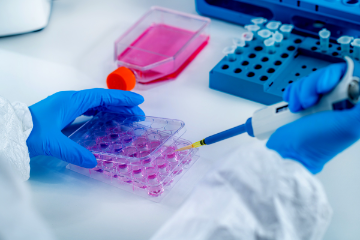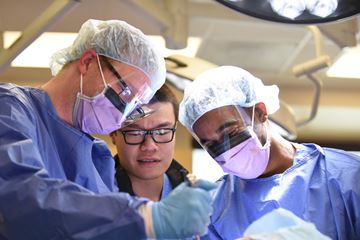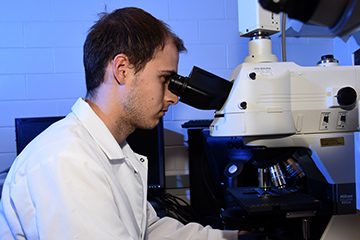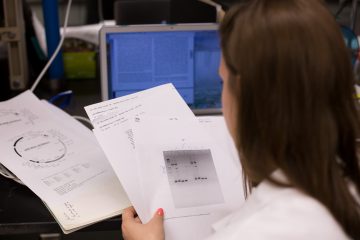IU School of Medicine is a state-of-the-art research campus that includes in vitro, in vivo bench research, translational research and clinical trials. Department of Surgery faculty are actively involved in a myriad of research projects independently, with local collaborators at Indiana University, Purdue and Notre Dame, and with national partners and clinical trials.
Research Facilities
Excellent core facilities, including proteomics, microarray, animal CT, PET, MRI imaging, molecular imaging, knock-out/transgenic animal, pathology, immunohistochemistry and vector are accessible to laboratories on campus to facilitate medical research. The Department of Surgery currently has premium laboratory space in the Medical Science Building and the new Research 3 Building. Additional research space for the Department of Surgery exists in the Medical Research and Library Building (IB) that contains two large animate operating rooms dedicated to the Department of Surgery and houses the Department of Surgery Center for Advanced Surgical Technology.
 Industry Research and Trials
Industry Research and Trials
The Indiana University School of Medicine Department of Surgery conducts groundbreaking research and industry trials on various scientific, medical, and healthcare topics. Our research centers and partner sites foster innovation, collaboration, and a wide range of studies, including basic, clinical, translational research, and industry trials. With over 500,000 square feet of research space across multiple buildings on the Indianapolis campus and other statewide campuses, our faculty, staff, and students are driving discoveries and advancements.
 Surgical Outcomes & Quality Improvement Center
Surgical Outcomes & Quality Improvement Center
Recently relocated to Indiana, the Surgical Outcomes & Quality Improvement Center (SOQIC) is a collaborative health services, outcomes, health policy, and quality and safety improvement research enterprise of more than 25 faculty, fellows, and staff. We are focused on measuring and improving health care quality locally, regionally, and nationally. Our research spans all surgical specialties and areas of medicine, with a particular focus on general surgery, surgical oncology and multidisciplinary oncology care, trauma/critical care, and vascular surgery. The group also has a focus on large-scale surgical education research and trials. IU SOQIC has robust training programs for medical students, surgical residents, and postdoctoral fellows, including multiple federally funded institutional training grants. The group has earned more than $40 million in funding, frequently published in high-impact journals like JAMA and NEJM, and trained more than 50 resident researchers over the past 15 years.
 Surgery Resident Research
Surgery Resident Research
Research residents in surgery are exceedingly productive during their research years and have been recipients of multiple awards and honors. Resident research is showcased in multiple forums, including the Surgical Research Forum, JK Berman Program, Grand Rounds, and Visiting Faculty Programs throughout the academic calendar year. In addition, the Department of Surgery supports presentation of resident work at regional and national meetings, and publication of their work in quality, peer-reviewed journals.
 MD Student Summer Research
MD Student Summer Research
The Department of Surgery offers summer research opportunities for first-year medical students focused on a variety of basic science and translational/clinical topics. First-year medical students who are interested in the program are encouraged to identify potential mentors within the department and to develop a short, 300-word research proposal to be reviewed by program leadership. Proposal submissions are due no later than April 15.
Students selected for the program receive a $2,500 stipend for an eight-week rotation. For more information and to apply please visit the IMPRS summer program application.
